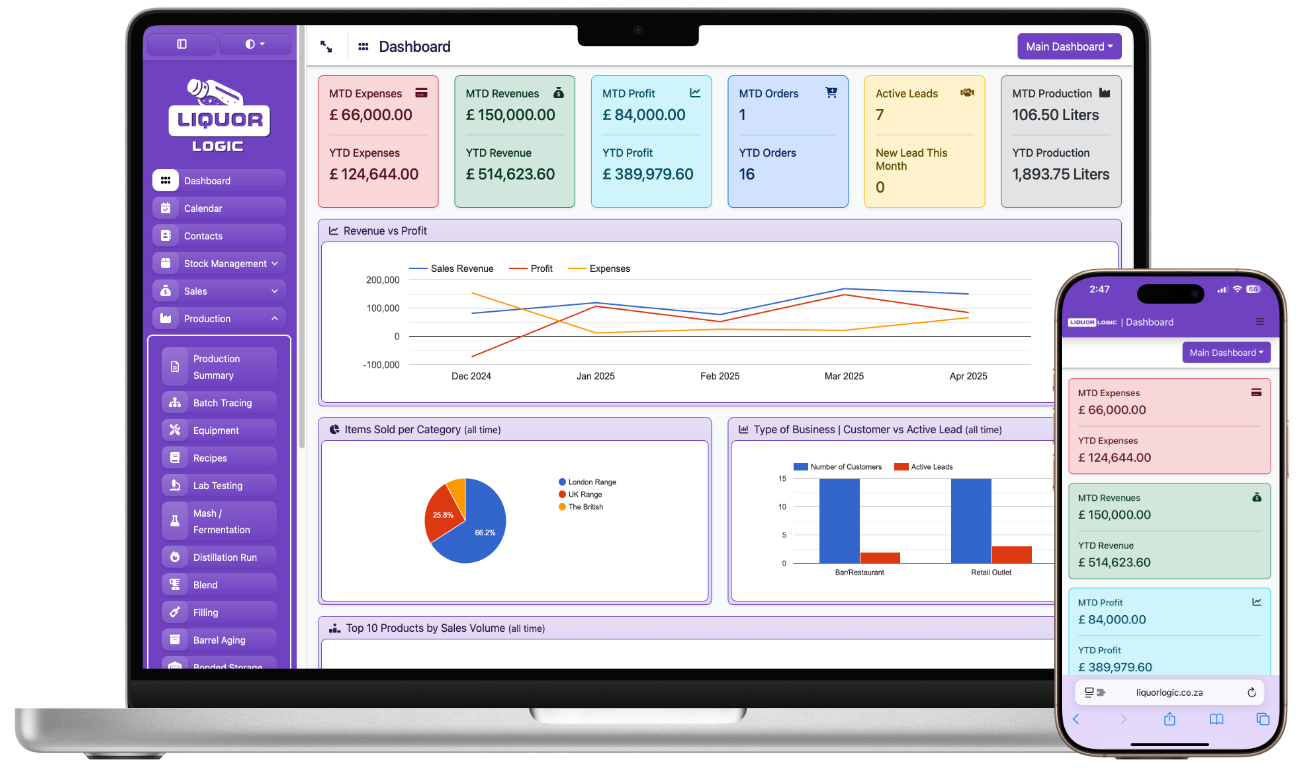Why Alcohol Producers Need Specialized Software in 2025

In today's fast-paced alcohol production industry, relying on generic ERP systems simply isn't enough. Specialized software tailored for distilleries, breweries, cideries, and wineries offers critical tools for inventory management, compliance, and production efficiency. Learn how the right system can streamline operations and drive growth in your business.
Let’s be honest and realistic — nowadays, running a company in alcohol production is not just about brewing, distilling, or winemaking.
It looks more like full-fledged business management. Starting to implement software will change the way you think about business, enhancing inventory management, traceability, and customer satisfaction. This alcohol production software is going to be your new best friend — you won’t be able to operate without it.
Why distilleries, breweries, cideries, and wineries need specialized management software in 2025:
- Challenges faced by distilleries, breweries, cideries, and wineries without software
- Enhancing quality control
- Key modules needed: Inventory, CRM, Production Stages, Recipe Costing, Excise, Financial Data
- Generic ERP (Enterprise Resource Planning) systems are not working well for alcohol producers
Challenges faced by the industry without software
Nowadays, distilleries, breweries, cideries, and wineries without software may face significant challenges with data. These difficulties can arise from several areas, such as:
- Streamlined inventory management – Keep track of your finished products and raw materials at all times
- Production planning – Never miss a production deadline again
- Data insights – Gain access to key metrics that help you plan your daily operations
- Calculating your true cost of goods – Maintain accurate costing of your operations
- And more
Certainly, implementing software is a challenge — however, it’s essential for a company’s growth and development.
Key modules needed
- CRM: What makes the software so powerful is the integration of an intuitive CRM platform. You may wonder what the benefits of having a CRM in your software are:
- Track all your customer communications
- Enhance collaboration with your sales department
- Streamline your workflow and sales
- Inventory management: Tracking products and raw materials is essential for anyone in the industry. It provides real-time updates on inventory levels. What are the advantages?
- It prevents shortages and overstocking. This feature ensures that necessary ingredients are always available, reducing unplanned downtime and keeping production smooth.
- Production Stages: Based on your day-to-day operations, you need to track your production stages — from mashing to bottling, including fermentation, aging, and more. Your data is as important as your product — it allows you to improve future batches and maintain consistent quality in your finished goods.
- Recipe Costing: By tracking landed costs for each of your products, you streamline your process and control your margins. Maintaining costs throughout the production stages becomes easy and accurate with the right software.
- Excise: Most countries require you to complete specific reports on a monthly, quarterly, or annual basis — also known as excise or duty taxes. These are legal requirements, and you need to ensure your data is accurate. What’s better than a system that keeps those records automatically and can generate reports at any given time?
- Financial Data: If you’re the owner of a business, the final goal of your daily operations is profitability — and visibility into that. Keeping track of expenses and revenues is crucial, and having software to give you this data live is non-negotiable.
Generic ERPs are not working well for alcohol producers
The biggest issue with “classic” ERP systems is that they don’t account for very specific industry features. A traditional ERP may provide financial KPIs, but not the metrics specific to the craft and process of alcohol production. Here’s why they fall short:
- Complex regulatory traceability: Alcohol production requires end-to-end traceability — from sourcing raw ingredients to bottling, packaging, and bonded storage. You need to comply with excise regulations, batch tracking, export rules, and more. Generic ERPs aren’t built with these frameworks in mind and often require expensive customization.
- Excise and tax compliance: Most off-the-shelf ERPs lack built-in modules for calculating excise duties or generating compliant reports for revenue authorities. This leads to manual work, errors, or penalties due to incorrect filings — a critical risk in this industry.
- Barrel ageing and loss tracking (Angel’s Share): Alcohol producers need to track product volume over time, including evaporation losses during barrel ageing. Standard ERPs don't support this kind of long-term inventory movement or variance tracking.
- Recipe-based production with ABV variation: Distilleries, wineries, and breweries don’t follow fixed production formulas like other industries. Recipes often vary by batch, with Alcohol By Volume (ABV) affecting yield, taxes, and costing. Generic systems assume predictable output — a poor fit for craft producers.
- Bonded storage management: Alcohol producers often operate under bonded warehouse rules, where stock can’t be released until duties are paid. A generic ERP doesn’t understand bonded vs. duty-paid stock separation, which is vital for compliance and audits.
- Event-based production flows: Your process isn’t linear — fermentation, distillation, ageing, blending, and bottling all happen on independent schedules. Traditional ERPs expect simple manufacturing flows, making production timeline management painful and inaccurate.
- Customer and distributor-specific rules: The alcohol industry has complex distribution chains with region-specific rules, restricted items, license checks, and delivery windows. Most ERPs can’t enforce these rules out of the box — leading to operational chaos and missed revenue opportunities.
At Liquor Logic, we provide the tools your alcohol business actually needs.
We’ve built Liquor Logic specifically for distilleries, wineries, breweries, and cideries — not generic manufacturers. From excise-ready reporting to ABV-based recipe management, bonded storage control, real-time inventory tracking, CRM integration, and traceability from grain to glass — our platform is tailored to your world.
No bloated features. No unnecessary complexity. Just software that speaks your language and scales with your craft.
If you’re ready to take control of your production, compliance, and growth — Liquor Logic is your next competitive advantage.
Back